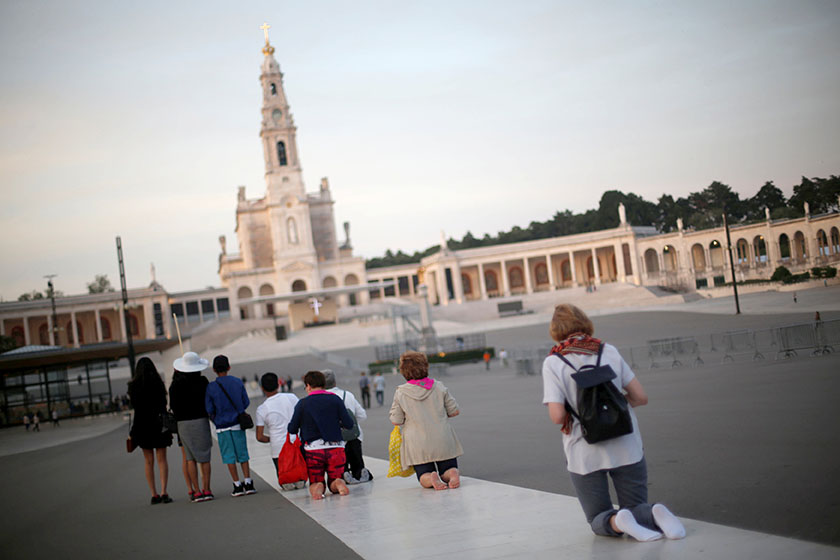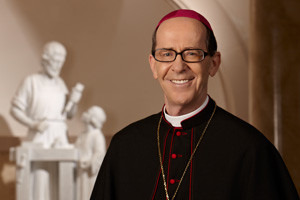
who saw Mary, during the apparitions 100 years ago. (CNS photo/Rafael Marchante, Reuters)
“Do whatever He tells you” (Jn 2:5). These words of the Mother of God at the Wedding Feast of Cana are like a bright beacon pointing the way to our happiness and the way to the Heart of Christ. It is not by chance that the Apostle who recorded them was the Beloved Disciple John who, at the Last Supper, rested his head near Jesus’ heart. He also was the only Apostle present at the foot of the Cross and the one to whom Jesus entrusted His mother to be our mother too.
Many centuries thereafter, a 100 years ago, Our Lady of Fatima appeared to three children in Portugal, calling for prayer and penance in order to draw us closer to her Beloved Son. So, what did Jesus tell His followers to do, 20 centuries ago, and what is He saying to us today through Our Lady of Fatima?
EN ESPAÑOL: ‘Haced lo que Él os diga’
His first command: Repent and believe

From the moment that Jesus began His public ministry, He boldly stated “The Kingdom of God is at hand. Repent and believe in the Gospel” (Mk 1:15). With a spirit of authority that had never been seen before, He awakened minds and hearts to His mission of overthrowing the kingdom of Satan and ushering in the Kingdom of God.
Jesus’ heart went out to the people, knowing that sin was weighing down their souls and wreaking havoc in their lives. “Many,” He warned, are taking “the broad road that leads to destruction,” but “few” are taking the “narrow road that leads to life” (Cf. Mt 7:13f).
Our Lady of Fatima echoed Jesus’ warning of sin’s destructive force, breaking down marriage and family life, sowing discord between peoples and nations, and planting doubts and disbelief where the Catholic faith had once been strong.
From the beginning of His public ministry, Jesus called for conversion of heart and obedience of faith. “Not everyone who says to me, ‘Lord, Lord’ will enter the Kingdom of heaven, but only the one who does the will of my Father in heaven” (Mt 7:21).
Listening for His voice

Long before Mary said, “Do whatever He tells you,” she had learned to recognize God’s voice, to seek His help in prayer, then to discern what He was asking her to put it into practice. We see a good example of this faithful discipleship at the time when the Angel Gabriel announced the plan for her to be the Mother of God.
When the Angel came into Mary’s presence with this message from on high, it seemed that He was asking her to abandon a promise she had already made to Him. So, she replied, “How can this be, since I have no relations with a man?” (Lk 1:34). She said this not out of rebellion to God’s will but with sincerity of heart, seeking to understand how God could want her to abandon her promise to remain a virgin. The Angel then reassured Mary, “The Holy Spirit will come upon you and the power of the Most High will overshadow you. Therefore the child to be born will be called holy, the Son of God … for nothing will be impossible for God” (Lk 1:37).
Mary teaches us that “doing whatever the Lord asks” can be difficult, requiring prayerful discernment, readiness to surrender our own plans and allowing the Lord to be the Master of our lives. Still, Mary gave an unconditional “Yes” to God’s plan, completely trusting in His goodness. She surrendered not just a thing but her very own self, “Behold, I am the handmaid of the Lord. May it be done to me according to your word” (Lk 1:38).
‘Do whatever He tells you’
Let us think back for a moment. … Few things in our lives have had more power over us than our mother’s expectations: A simple glance in our direction or a few words perhaps are enough to get us going. A mother’s expectations are a powerful thing!
When wine ran low at the Wedding Feast in Cana, Mary did not tell Jesus what to do. She said four simple words to her Son: “They have no wine” (Jn 2:3). Then, turning to the servants she said, “Do whatever He tells you.” Incredibly then, upon Mary’s very words, the first miracle of our Savior occurred. Such is the power of a mother’s expectation.
When Jesus talked about His mission in the world, He said, “The Son of Man did not come to be served but to serve, and to give His life as a ransom for many.” God created us in His own image and likeness; so, only when we wish to be like Him, who rejoiced in being a son and servant of the Father, can we find happiness in this life and be happy with Him forever in heaven.
Over the centuries, in every age and on every continent, Mary continues her maternal role, helping us to imitate her Beloved Son. This is exactly what she was doing when she appeared to the children at Fatima. This is what she assists us to do in our time and place in history. Let us rejoice, then, in being invited by Mary to do the Lord’s will, thereby becoming faithful and beloved disciples of Jesus.






